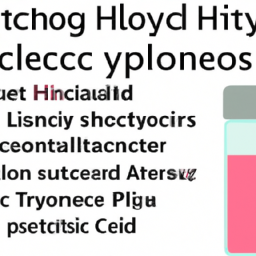Read: Alternative therapies for Helicobacter pylori: probiotics and phytomedicine

Although approximately half of the human population is colonized by H. pylori, only about 10–20% are likely to develop peptic ulcer, and only 1–2% are at risk for either gastric cancer ormucosa-associated lymphoid tissue lymphoma.
2023-02-20
All About Pylori Testing: Frequently Asked Questions
2023-02-20Read: Alternative therapies for Helicobacter pylori: probiotics and phytomedicine

Read: Alternative therapies for Helicobacter pylori: probiotics and phytomedicine
-
Table of Contents
- Introduction
- Comparing the Efficacy of Alternative Therapies for Treating Helicobacter Pylori: Probiotics
- Phytomedicine
- Phage Therapy
- and Bacteriocin
- Investigating the Potential of Phage Therapy and Bacteriocin for Treating Helicobacter Pylori
- Exploring the Benefits of Probiotics and Phytomedicine for Treating Helicobacter Pylori
- Conclusion
“A Natural Solution to Treat H. pylori: Read to Discover Probiotics and Phytomedicine!”
Introduction
Helicobacter pylori (H. pylori) is a type of bacteria that can cause a range of gastrointestinal issues, including ulcers and gastritis. While traditional treatments for H. pylori involve antibiotics, there are a number of alternative therapies that may be effective in treating the infection. This article will discuss two of these alternative therapies: probiotics and phytomedicine. Probiotics are live microorganisms that can help to restore the balance of bacteria in the gut, while phytomedicine is the use of plant-based medicines to treat a variety of conditions. Both of these therapies have been studied for their potential to treat H. pylori, and this article will explore the evidence for their effectiveness.<h3 id=”wpaicg-comparing-the-efficacy-of-alternative-therapies-for-treating-helicobacter-pylori-probiotics–phytomedicine-phage-therapy-and-bacteriocin“>Comparing the Efficacy of Alternative Therapies for Treating Helicobacter Pylori: Probiotics, Phytomedicine, Phage Therapy, and Bacteriocin
The efficacy of alternative therapies for treating Helicobacter pylori (H. pylori) has been the subject of much research in recent years. This bacterium is a major cause of gastric ulcers and is associated with an increased risk of gastric cancer. As such, it is important to identify effective treatments for this condition. In this article, we will compare the efficacy of four alternative therapies for treating H. pylori: probiotics, phytomedicine, phage therapy, and bacteriocin.
Probiotics are live microorganisms that are thought to have beneficial effects on human health. Several studies have shown that probiotics can reduce the symptoms of H. pylori infection, as well as reduce the number of bacteria present in the stomach. However, the efficacy of probiotics in treating H. pylori is still uncertain, and further research is needed to determine their effectiveness.
Phytomedicine is the use of plant-based medicines to treat various conditions. Several studies have shown that certain plant extracts can reduce the symptoms of H. pylori infection, as well as reduce the number of bacteria present in the stomach. However, the efficacy of phytomedicine in treating H. pylori is still uncertain, and further research is needed to determine its effectiveness.
Phage therapy is the use of viruses to target and destroy specific bacteria. Several studies have shown that phage therapy can reduce the symptoms of H. pylori infection, as well as reduce the number of bacteria present in the stomach. However, the efficacy of phage therapy in treating H. pylori is still uncertain, and further research is needed to determine its effectiveness.
Bacteriocin is a type of protein produced by certain bacteria that can inhibit the growth of other bacteria. Several studies have shown that bacteriocin can reduce the symptoms of H. pylori infection, as well as reduce the number of bacteria present in the stomach. However, the efficacy of bacteriocin in treating H. pylori is still uncertain, and further research is needed to determine its effectiveness.
In conclusion, while all four of these alternative therapies have been shown to have some potential for treating H. pylori, further research is needed to determine their efficacy. It is important to note that these therapies should not be used as a substitute for conventional treatments, such as antibiotics, and should only be used under the supervision of a qualified healthcare professional.<h3 id=”wpaicg-investigating-the-potential-of-phage-therapy-and-bacteriocin-for-treating-helicobacter-pylori”>Investigating the Potential of Phage Therapy and Bacteriocin for Treating Helicobacter Pylori
Helicobacter pylori (H. pylori) is a type of bacteria that can cause a range of gastrointestinal issues, including ulcers and gastritis. While antibiotics are the most common treatment for H. pylori, there is growing interest in the potential of phage therapy and bacteriocin for treating this infection.
Phage therapy is a form of treatment that uses viruses to target and destroy specific bacteria. Phages are naturally occurring viruses that can infect and kill bacteria, and they have been used to treat bacterial infections for over a century. In the case of H. pylori, phage therapy has been shown to be effective in reducing the number of bacteria in the stomach.
Bacteriocin is another potential treatment for H. pylori. Bacteriocin is a type of protein produced by certain bacteria that can kill other bacteria. It has been shown to be effective in killing H. pylori in laboratory studies, and it is being investigated as a potential treatment for H. pylori infections.
Both phage therapy and bacteriocin have the potential to be effective treatments for H. pylori. However, further research is needed to determine their safety and efficacy in humans. Clinical trials are currently underway to evaluate the effectiveness of these treatments, and the results of these studies will help to determine whether they can be used to treat H. pylori infections in the future.<h3 id=”wpaicg-exploring-the-benefits-of-probiotics-and-phytomedicine-for-treating-helicobacter-pylori”>Exploring the Benefits of Probiotics and Phytomedicine for Treating Helicobacter Pylori
Helicobacter pylori (H. pylori) is a type of bacteria that can cause a range of gastrointestinal issues, including ulcers and gastritis. While antibiotics are the most common treatment for H. pylori, there is growing evidence that probiotics and phytomedicine may also be effective in treating this condition.
Probiotics are live microorganisms that are found naturally in the human body, and they are believed to have a range of health benefits. Studies have shown that probiotics can help to reduce the symptoms of H. pylori, as well as reduce the risk of recurrence. Probiotics can be taken in supplement form, or they can be found in certain foods, such as yogurt and fermented vegetables.
Phytomedicine is a form of medicine that uses plant-based compounds to treat a variety of conditions. Studies have shown that certain phytomedicines, such as garlic, ginger, and turmeric, can be effective in treating H. pylori. These compounds are believed to have anti-inflammatory and antibacterial properties, which can help to reduce the symptoms of H. pylori.
Overall, probiotics and phytomedicine may be beneficial in treating H. pylori. While more research is needed to fully understand the effects of these treatments, they may be a safe and effective alternative to antibiotics. It is important to speak to a healthcare professional before taking any supplements or herbal remedies, as they can interact with other medications.
Conclusion
In conclusion, probiotics and phytomedicine are two promising alternative therapies for Helicobacter pylori. While more research is needed to determine the efficacy of these therapies, they offer a potential alternative to traditional treatments such as antibiotics. Probiotics and phytomedicine may be especially beneficial for those who cannot tolerate or do not respond to traditional treatments. As such, they should be further explored as potential treatments for Helicobacter pylori.
If you’re looking for alternative therapies for Helicobacter pylori, consider probiotics and phytomedicine! For more information on these treatments, click here to visit eTestMedical.com.
The article originally published in FEMS Immunology & Medical Microbiology, Alternative therapies for Helicobacter pylori: probiotics and phytomedicine, offer a lot benifical ideas.



